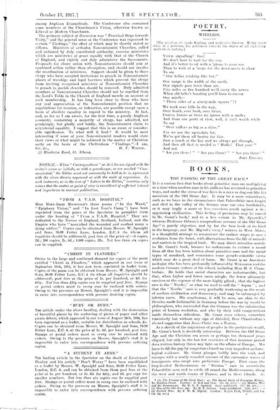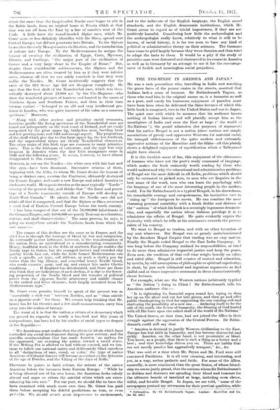B 0 0 K S .
THE PASSING OF THE GREAT RACE.*
IT is a curious fact that books about primitive Instil are multiplying at a time when modern man in his millions has reverted to primitive ways, and sunder the stress of war lives in a cave or dug-out like hi; ancestors of the Old Stone Age. It may be a more coincidence, such as we have in the circumstance that Palaeolithic men fought and died in the valley of the Somme near our own battleliebts, or it may imply a mom or less conscious revolt against It dis- appointing civilization. This feeling of pessimism may be traced in Mr. Grant's hook,' and to a loss extent in Mr. Spurrells,. whereas Professor Osborn's compendious account of the Old Stone Ag0 is purely objective, and by far the best book of its kind in the language, and Mr. Migood's essay' written in West Africa, is a thoughtful attempt to reconstruct the earliest stages in man's evolution from the beast, with illustrations from the life of annuals and natives in the tropical bush. Wo may direct attention mainly to Mr. Grant's book, because ho endeavours to extract a moral from all that has boon written about primitive men and the racial types of mankind, and enunciates some pseudo-scientific views which may do a great deal of harm. Mr. Grant is an American zoologist who has been profoundly influenced by Weismann and Om modern Gorman writers of his school, including Horr H. S Cham- berlain. Ile holds that racial characters are indestructible, but that, when higher and lower races mingle, the lower ultimately survives at the expense of the snore highly gifted ; that the highest race is the " Nordie," or what we used to call the " Aryan " ; fuel that the " Nordic" race is very gradually weakening as the remit of moderns civilisation and democracy, and may bo submerged by inferior races. His conclusions, it will bo seen, are akin to the theories made fashionable in Germany before the war by would-be philosophers, who contended that the German was the culminnting point of human evolution, and who by their wild exaggeratioes made themselves ridiculous. Mr. Grant oven echoes, sarnewlnot tentatively but without any sign of disbelief, Herr Chamberlain's absurd suggestions that Scours Christ seas a 'reunion.
As a sketch of the migrations of peoples in the prehistoric world, Mr. Grant's book is decidedly interesting. Between the Old Stone Age and the Christian era seven or perhaps ton thousand years elapsed, but only in tho last few centuries of that immense period does written history throw any light on the affairs of Europe. We have to fill the gap by eonjecturesbesed ens very imperfect archaeo- logical evidence. Mr. Grant plunges boldly into the void, and emerges with a neatly rounded account of the successive waves of immigrants who swept into prehistoric Europe. First came the long-headed Mediterranean or " Iberian " race to overwhelm Palaeolithic men and to settle all round the Mediterranean, along the west and north coasts of France, and in these islands. As • 0,) The Passing of the Great (tare; or, The Racial Basil of Enrapran Rielara. By Madison Grant. London: O. Bell and Bonn. 18n. Gd. set.)--(2) Modern Mira end Me forerennere. By M. G. F. Slimed!. tame publishers. (7s. 0.1. netf -- (3) lees of the Old Stan, der. By B. V. Osborn. Same publisher.. pls. net.! Earlkst Man. By P. W. U. Miseett. tendon: gun Tsui, Trench, and Cu. Ms. (id. nct.I about the same time the long-headed Nordic race began to stir in the Baltic lands, frown an original home in Russia which at that time was out off from the East by a line of marshes west of the Crab. A little later the round-headed Alpine race, which Mr. Grant more or less definitely identifies with the Slays, spread over Central Europe, but did not penetrate into Britain. To the Alpines Ire ascribes till:, early alesoput arnian civilizat ion, and the introduction of culture into Europe. To the Mediterraneans he assigns the honour of creating the civilization of Egypt, Crete, ale-cane°, Etruria, and Carthage, " the major part of the civilisation of Greece and a very large share in the Empire of Rome." Bat, despite these considerable achievements, the Alpines and the Mediterraneans are often treated by }kiln as if they were inferior races, whereas all that we can safely conelude is that they were unlike the Nordics. Mr. Grant incidentally suggests that the races of the Old Stone Age slid not disappear completely. He says that the best skull of the Neanderthal race, which was theo- retically destroyed about 23,000 s.c. by the Cro-Magnons—who drew the wonderful pictures of hunters and bunted in the eaves of Northern Spain and Southern France, and then in their turn became extinct—" belonged to an old and very intellectual pro- fessor in London, who was quite innocent of his value as a museum specimen." Moreover,
" Along with other ancient and pritnitivo racial remnants, ferocious gorilla like living specimens of the Neanderthal man are found not infrequently on the treat coast of Ireland, and are easily recognized by the great upper lip, bridgeless nose, beetling brow and low growing hair, and wild and savage aspect. The proportions of the skull which give rise to this large upper lip, the low forehead, and the ensperorbital ridges are clearly Neanderthal characters. Tice other traits of this Irish typo are common to many primitive races. This is the Irishman of caricature, and the type was very frequent in America when the first Dials immigrants came in 1840 and the following years. It seems, however, to have almost disappeared in this country."
However, in our era the Nordics—the white men with fair hair and blue eyes—have been dominant. Successive swarms of them, beg • g with the Celts, to whom Mr. Grant denies the honour of being a distinct race, overran the Continent, ultimately destroyed the Roman Empire, and made a new Europe and added America to the known world. He regards Sweden as the moat typically " Nordic " country of the present day, and thinks that " the finest and purest type of a Nordic community outside of Europe will develop in North-West Canada." He admits that the Nordic race did not retain all that it conquered, and that the Alpines or Slays recovered a zood deal of Eastern Central Europe before the tenth century. " .t has been computed that out of the 70,000,000 inhabitants of the German Empire, only 9,000,000 are purely- Teutonic in coloration, stature, and skull characteristics." The same process, he says, is going on everywhere outside the Northern lauds from which the
[rife CalnC :-
" The causes of this decline are the same as in France, and the chief loss is through the a aatage of blood by war and emigration. An extremely- potent influence, however, is the transformation of tine nation from an agricultural to a manufacturing community. Heavy, healthful work in the fields of northern Europe enables the Nordic type to thrive, but the cramped factory and crowded city quickly weeds him out, while the little brunet Mediterranean can work a spindle, sot type, sell ribbons, or push a clerk's pen far Meter than the big, clumsy, and somewhat heavy Nordic blond, who needs exercise, meat, and air, and cannot live under Ghetto conditions. . . if England has deteriorated, and there are those who think they see hells-miens of such decline, it is due to the lower- ing proportion of the Nordic blood and the transfer of political power from the signore. Nordic aristocracy and middle classes to the radical and labor elements, both largely recruited from the Mediterranean type."
Mr. Grant even permits himself to speak of the present war as "essentially a civil war" between Nordics, and as "class suicide ors a gigantic scale " for them. We cannot help drinking that Mr. Grant has let his theories and a few skull-measurements carry him away into the realms of fantasy.
The worst of it is that the author, a citizen of a democracy which has proved its capacity in nearly a hundred and fifty years of independence, 1111.5 been led by his studies of racial types to despair of the Republic:- " We Americans must realize that the altruistic ideals which have controlled our social development during the past century, and the maudlin sentimentalism that has made America ' ell asylum for the oppressed,' are sweeping the nation toward a racial abyss. If the Melting Pot is allowed to boil without control, and we cam- titsue to follow our national motto and deliberately blind ourselves to all ' distinctions of race, creed, or color,' the type of native American of Colonial descent will become as extinct no the Athenian of the age of Pericles, and the Viking of the days of Rollo."
Elsewhere he paints in lurid colours the retreat of the native American before the ittcomers from Eastern Europe. " While Ise is bring elbowed out of kis own home, the American looks calmly abroad and urges on others the suicidal ethics which are ender. nainating his own race." For our part, we should like to have the facts examined with much more care than Mr. Grant has paid. them before accepting his doleful predictions as true, or oven. probable. We should attach great importance to environment,
and to the influents° of the English language, the English moral standards, and the English democratic institutions, whieh Mr. Grant seems to regard as of trivial importance, if they are not positively harmful. Considering how little the archaeologist and the anthropologist really lmow, relatively to what is still to be known, of racial history, it is far too soon to have any kind of political or administrative theory on their sciences. The Germans have come to grief largely because they wove theories and then tried to adapt the facts to them. It would be a pity if the study of primitive man were distorted and obstructed in its course in America as well aa in Germany by an attempt to use it for the encourage- ment of foolish and meaningless racial prejudices.



































 Previous page
Previous page